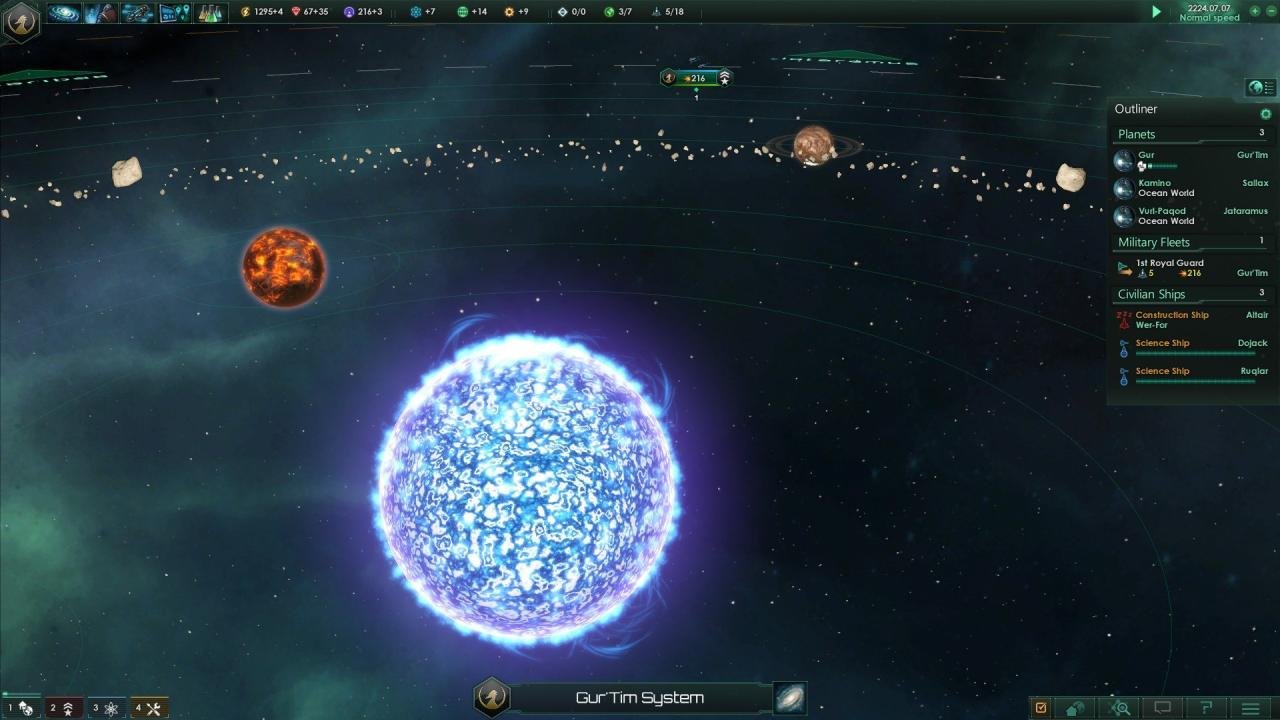
Stellaris: A Journey Through the Stars
Related Articles
- Super Smash Bros. Melee
- Assetto Corsa Competizione: A Deep Dive Into The World Of Competitive Sim Racing
- Spike Volleyball: A Comprehensive Guide To Dominating The Court
- Riders Republic: A Thrilling Adventure In Extreme Sports
- Hot Wheels Unleashed: A Deep Dive Into The Thrill Of Miniature Racing
Introduction
Discover everything you need to know about Stellaris: A Journey Through the Stars
Stellaris: A Journey Through the Stars

Introduction
Stellaris, developed by Paradox Development Studio, is a grand strategy game that invites players to embark on a cosmic journey of exploration, expansion, and galactic domination. This captivating game allows players to create their own spacefaring civilization, shaping its culture, technology, and political structure, and leading it through the perils and triumphs of interstellar conquest.
Gameplay
Stellaris is a complex and layered game with a multitude of systems and mechanics intertwined to create a rich and dynamic gameplay experience. Let’s dive into the core elements of Stellaris:
1. Civilization Creation:
The journey begins with the creation of your civilization. You’ll define its origins, its ethics, its government, and its unique traits. These choices will shape the starting conditions and the direction your civilization will take throughout the game.
- Origins: These define your civilization’s starting conditions, such as being a fallen empire, a technologically advanced society, or a struggling, newly-emerged civilization.
- Ethics: These dictate your civilization’s moral principles, influencing your interactions with other empires and the choices you make throughout the game.
- Government: This determines your civilization’s political structure, influencing your internal stability, resource management, and diplomatic approach.
- Traits: These provide unique bonuses and penalties, adding depth and individuality to your civilization.

2. Exploration:
The vastness of space awaits your exploration. You’ll send out science ships to survey the galaxy, discovering new star systems, planets, anomalies, and potentially hostile alien civilizations.
- Star Systems: The galaxy is comprised of numerous star systems, each containing planets, resources, and potentially habitable worlds.
- Anomalies: These are unique events or locations scattered throughout the galaxy, offering opportunities for research, exploration, and sometimes, conflict.
- First Contact: The moment you encounter another civilization is a pivotal one. It can lead to peaceful interactions, trade agreements, or even war.
3. Expansion:
As your civilization grows, you’ll expand your territory by colonizing new planets and establishing outposts. You’ll need to manage your population, resources, and infrastructure to ensure your empire’s prosperity.
- Colonization: You’ll establish colonies on suitable planets, expanding your territory and increasing your resource production.
- Resource Management: You’ll need to manage your resources effectively, balancing your spending on research, construction, and military expansion.
- Infrastructure: Building infrastructure, such as mining stations, research labs, and energy grids, is crucial for resource production and technological advancement.
4. Research:
The pursuit of knowledge is paramount in Stellaris. You’ll invest in research to unlock new technologies, improving your fleets, your economy, and your civilization’s overall power.
- Technology Tree: The technology tree is a vast network of interconnected technologies that you can research to advance your civilization.
- Research Priorities: You’ll need to prioritize research areas based on your strategic goals, whether it’s focusing on military superiority, economic growth, or scientific exploration.
5. Diplomacy:
The galaxy is a complex tapestry of diverse civilizations, each with their own goals and ambitions. You’ll engage in diplomacy, forging alliances, forming trade agreements, and navigating the delicate balance of power.
- Embassies: Establishing embassies with other empires allows you to build relationships, engage in trade, and potentially form alliances.
- Diplomacy Screen: The diplomacy screen provides a comprehensive overview of your relationships with other empires, allowing you to manage diplomatic interactions.
- Wars and Alliances: You can engage in wars to expand your territory or defend against aggression, or forge alliances to strengthen your position and protect your interests.
6. Warfare:
Conflict is an inevitable part of galactic life. You’ll build fleets of warships to defend your empire, conquer new territories, and assert your dominance.
- Fleet Design: You’ll design and customize your fleets, choosing from a wide range of ship types, weapons, and technologies.
- Naval Battles: You’ll engage in epic naval battles, utilizing tactics, fleet composition, and technological superiority to achieve victory.
- Military Doctrine: You’ll define your military doctrine, influencing your fleet’s tactics and combat strategies.
Walkthrough
Here’s a basic walkthrough to guide you through your first Stellaris experience:
Early Game:
- Start Strong: Choose an origin and ethics that provide a strong starting position and align with your playstyle.
- Explore: Send out your science ships to explore the galaxy, discover new systems, and establish contact with other civilizations.
- Research: Prioritize research areas that support your early game goals, such as resource production, ship construction, and early technologies.
- Expand: Colonize habitable planets to expand your territory and boost your resource production.
- Diplomacy: Establish embassies with other empires to build relationships and explore potential alliances.
Mid Game:
- Technological Advancements: Continue researching technologies to improve your fleets, your economy, and your overall power.
- Expansion and Infrastructure: Continue expanding your territory and building infrastructure to support your growing empire.
- Military Buildup: Begin building a strong fleet to defend your empire and prepare for potential conflicts.
- Strategic Alliances: Form alliances with other empires to secure your position and protect your interests.
Late Game:
- Galactic Domination: Consider your goals – do you want to conquer the galaxy, form a powerful federation, or pursue a peaceful path of scientific advancement?
- Advanced Technologies: Unlock advanced technologies, such as terraforming, advanced ship designs, and powerful weapons.
- Diplomacy and Warfare: Engage in diplomacy to maintain peace or wage war to achieve your goals.
- Endgame Crisis: Prepare for the endgame crisis, a challenging event that threatens the stability of the galaxy.
Tips and Tricks
Here are some tips and tricks to help you succeed in Stellaris:
- Prioritize Research: Focus on research areas that align with your strategic goals and provide immediate benefits.
- Manage Resources: Balance your spending on research, construction, and military expansion to ensure your empire’s prosperity.
- Diplomacy is Key: Engage in diplomacy to forge alliances, secure trade agreements, and avoid unnecessary conflicts.
- Build a Strong Fleet: Invest in a powerful fleet to defend your empire and achieve your goals.
- Explore and Discover: Send out science ships to explore the galaxy, discover new technologies, and uncover hidden secrets.
- Adapt and Evolve: Be prepared to adapt your strategies and tactics as the game progresses and new challenges arise.
Advanced Strategies
For experienced players, here are some advanced strategies to master the game:
- Exploiting Anomalies: Take advantage of anomalies to gain valuable resources, unlock unique technologies, or even gain an advantage in warfare.
- Strategic Resource Management: Master the art of resource management, optimizing your production and consumption to achieve maximum efficiency.
- Advanced Fleet Composition: Experiment with different fleet compositions, utilizing specialized ship types and technologies to maximize your combat effectiveness.
- Diplomacy and Espionage: Use diplomacy to manipulate other empires, forming alliances and sowing discord among your rivals.
- The Power of Federation: Form a strong federation with other empires to achieve shared goals, increase your influence, and strengthen your position in the galaxy.
Conclusion
Stellaris is a game of endless possibilities, offering a rich and rewarding experience for players of all skill levels. Whether you’re a seasoned grand strategy veteran or a newcomer to the genre, Stellaris invites you to embark on a captivating journey through the stars, shaping the destiny of your civilization and leaving your mark on the galaxy.
Frequently Asked Questions
Q: What are the different game modes in Stellaris?
A: Stellaris offers several game modes, including:
- Grand Strategy: The main game mode, where you control a civilization and guide it through exploration, expansion, and galactic domination.
- Multiplayer: Play with friends or other players online, engaging in cooperative or competitive gameplay.
- Scenario: These are special game modes with unique starting conditions, objectives, and challenges.
Q: What are the different victory conditions in Stellaris?
A: Stellaris offers various victory conditions, including:
- Domination: Conquer all other empires in the galaxy.
- Science: Reach the highest level of technological advancement.
- Unification: Unite all empires in the galaxy under your leadership.
- Diplomacy: Form a strong federation with other empires and achieve a specific diplomatic goal.
Q: How do I manage my economy in Stellaris?
A: Managing your economy effectively is crucial for success in Stellaris. Focus on:
- Resource Production: Optimize your resource production by building mining stations, energy grids, and other infrastructure.
- Resource Allocation: Allocate your resources wisely, investing in research, construction, and military expansion.
- Trade: Engage in trade with other empires to acquire resources that you lack or to sell surplus resources.
Q: How do I build a powerful fleet in Stellaris?
A: Building a powerful fleet requires careful planning and resource management. Consider:
- Ship Design: Experiment with different ship types, weapons, and technologies to create a well-balanced fleet.
- Fleet Composition: Mix and match ship types to create specialized fleets for different combat roles.
- Military Doctrine: Choose a military doctrine that aligns with your playstyle and your fleet composition.
Q: What are the endgame crises in Stellaris?
A: Endgame crises are challenging events that threaten the stability of the galaxy. They can range from:
- Fallen Empires: Awakening of ancient and powerful civilizations.
- The Unbidden: A mysterious and hostile alien race.
- The Contingency: A robotic uprising that seeks to exterminate organic life.
Q: How do I deal with the endgame crises?
A: Endgame crises require careful planning and preparation. Focus on:
- Technological Advancement: Unlock advanced technologies to improve your fleets, your economy, and your defenses.
- Diplomacy: Form alliances with other empires to create a united front against the crisis.
- Military Strength: Build a powerful fleet and prepare for a challenging war.
Source URL:
Closure
We hope this article has helped you understand everything about Stellaris: A Journey Through the Stars. Stay tuned for more updates!
Don’t forget to check back for the latest news and updates on Stellaris: A Journey Through the Stars!
Feel free to share your experience with Stellaris: A Journey Through the Stars in the comment section.
Stay informed with our next updates on Stellaris: A Journey Through the Stars and other exciting topics.

